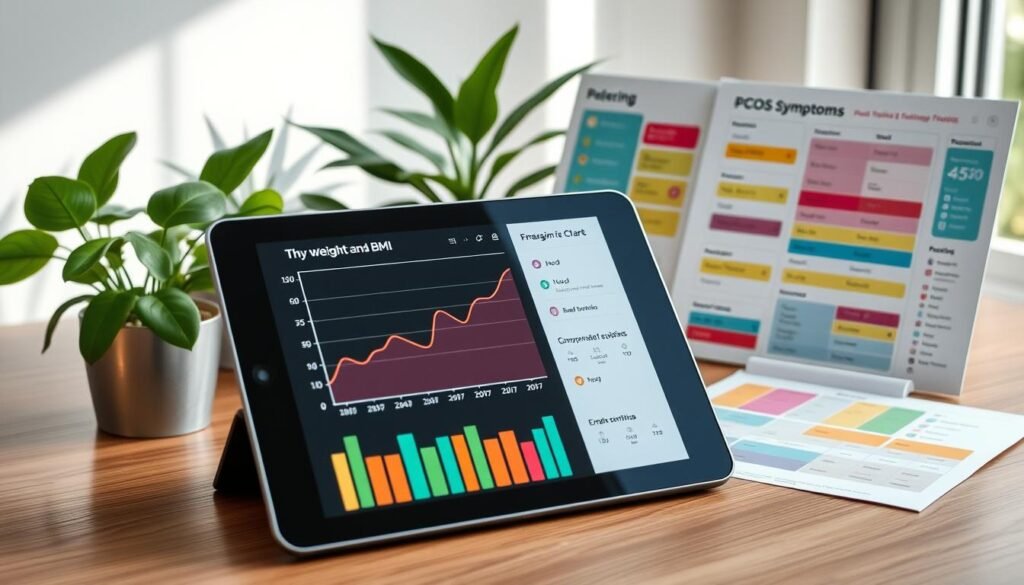Nearly 1 in 10 women of childbearing age in the U.S. have Polycystic Ovary Syndrome (PCOS). This shows the urgent need for effective PCOS management methods. Keeping an eye on weight and Body Mass Index (BMI) is key. By doing this, people can learn a lot about their health. This helps them make important lifestyle changes to lessen symptoms.
Managing weight is critical in lowering health risks linked to PCOS, like diabetes and heart problems. Hence, tracking weight with a focus on data is not just helpful—it’s crucial. It empowers women to make their health better. For detailed info on weight tracking for PCOS, visit this comprehensive article.
Key Takeaways
- PCOS affects approximately 10% of women of reproductive age.
- Consistent monitoring of weight and BMI can guide effective PCOS weight management.
- Tracking weight helps in understanding individual health metrics.
- Weight management is essential for reducing diabetes and cardiovascular risks associated with PCOS.
- A data-driven approach empowers better health decisions for women with PCOS.
Understanding PCOS: An Overview
Polycystic Ovary Syndrome (PCOS) is a hormonal issue many women face. It leads to symptoms like irregular periods, weight gain, and more. Knowing these signs is key for early help and control.
PCOS is often caused by hormonal imbalances. This can include high insulin and androgen levels, messing with ovary functions. Both genetics and the environment play roles in PCOS risk, making it crucial to be aware.
Managing PCOS well means understanding its complexities fully. Learning about its symptoms and causes helps women make informed health choices. With this knowledge, women can better manage their condition and improve their health.
| Symptoms of PCOS | PCOS Causes | Management Strategies |
|---|---|---|
| Irregular menstrual cycles | Hormonal imbalance | Lifestyle changes |
| Weight gain | Insulin resistance | Diet and exercise |
| Acne | Genetics | Medical treatment |
| Excessive hair growth | Inflammation | Coping mechanisms |
| Fertility issues | Environmental factors | Monitoring and support |
Importance of Weight Management in PCOS
For women with polycystic ovary syndrome (PCOS), managing weight is key. It helps improve insulin sensitivity and menstrual regularity. It also lowers the risk of diseases like type 2 diabetes.
Eating right and staying active are crucial for managing PCOS. Making these changes can improve your life quality. It helps you handle this hormonal condition better. You can find more about the role of body mass index in PCOS here.
Losing a little weight brings big health perks. Here are some of the top benefits:
| Benefit | Impact on PCOS |
|---|---|
| Improved Insulin Sensitivity | Reduces the risk of developing type 2 diabetes. |
| Regulated Menstrual Cycles | Promotes better reproductive health. |
| Decreased Risk of Heart Disease | Mitigates long-term health complications. |
| Heightened Energy Levels | Enhances overall well-being. |
Encouraging women to manage their weight can improve PCOS symptoms. Focusing on diet, exercise, and lifestyle changes helps take control of health.
Tracking Weight and BMI for PCOS
Handling polycystic ovary syndrome (PCOS) means knowing how weight and BMI matter. These numbers shed light on health risks and how well lifestyle changes are working. By keeping an eye on these, you can tweak your diet and exercise to feel better.
Why Weight and BMI Matter for PCOS
Grasping why BMI matters in PCOS is crucial for better health. Studies show staying at a healthy weight eases PCOS symptoms like hormonal imbalances and insulin issues. Since a high BMI can flag risks for diseases like heart trouble or diabetes, it’s key to watch these figures.
How to Track Weight Effectively
There are easy ways to monitor weight for health. Here are handy hints:
- Keep a journal to note daily weight along with diet or workout details.
- Use mobile apps that make tracking weight and BMI easy.
- Have a set time for weighing yourself daily for consistent results.
Making these steps part of your routine boosts focus and gives a true view of your PCOS progress.
| Tracking Method | Description | Benefits |
|---|---|---|
| Journal | Log daily weight and health updates. | Encourages awareness and responsibility. |
| Mobile Apps | Use tech for keeping an eye on wellness. | Offers convenience and regular reminders. |
| Regular Weigh-Ins | Stick to a consistent daily timing. | Guarantees reliable tracking over periods. |
Utilizing a BMI Calculator for PCOS
Using a BMI calculator for PCOS is a hands-on way to keep an eye on health. It’s key for individuals to know how to use this tool. This is because it helps figure out if someone’s weight is healthy.
Such calculators are great for seeing weight changes over time. Checking BMI monthly is a good idea, especially for those with PCOS. This is important for hormone balance and better insulin sensitivity.
Results from a BMI calculator should be looked at with other factors in mind. Things like muscle mass and overall health matter too. Talking to a healthcare expert offers more personalized advice. For eating better with PCOS, looking into diet changes is smart.

PCOS Diet and Exercise: A Comprehensive Approach
Managing polycystic ovary syndrome (PCOS) is about balance. It involves a proper PCOS diet and specific workouts for PCOS. Diet and exercise together can boost health significantly. This part explores the optimal foods for PCOS and details suitable workout plans for affected individuals.
Best Foods for Managing PCOS
For PCOS management, a well-structured diet focuses on foods that help balance hormones and improve insulin sensitivity. Important food groups include:
- Whole grains like quinoa and brown rice
- Lean proteins, such as chicken, turkey, and legumes
- Healthy fats from avocados, nuts, and olive oil
- Antioxidant-rich fruits and vegetables
- Low-sugar dairy alternatives
Adding these foods to your daily diet can enhance metabolic health. It also reduces PCOS symptoms. For more on lifestyle changes, read this study.
Effective Workout Routines
Exercise is key in managing PCOS, alongside a proper PCOS diet. It helps with maintaining a healthy weight and improving insulin sensitivity. Consider these exercises for PCOS:
| Type of Exercise | Frequency | Benefits |
|---|---|---|
| Cardiovascular workouts (e.g., brisk walking, cycling, swimming) | 150 minutes per week | Improves heart health and supports weight loss |
| Strength training (e.g., weightlifting, resistance bands) | 2-3 times per week | Increases muscle and enhances metabolism |
| Yoga and Pilates | At least once per week | Lowers stress and boosts flexibility |
Blending these exercises into your routine can boost wellness. It aids in managing PCOS effectively. Pairing a focused diet for PCOS management with consistent exercise leads to better health.
Monitoring PCOS Symptoms Alongside Weight
Managing polycystic ovary syndrome (PCOS) means tracking not just weight, but also PCOS symptoms. Watching various symptoms helps understand if treatment works. Taking a whole-health approach merges weight control with symptom tracking.
Keeping a symptom diary helps a lot. People can note their hormonal changes, energy, and menstrual cycles. This diary helps spot links between symptoms and weight efforts.
To better track, try these steps:
- Record daily symptoms: Write down mood swings, acne, or hair issues. Frequent notes reveal patterns.
- Associate symptoms with weight changes: See if weight shifts match symptom changes.
- Review periodically: Go over your notes regularly to see progress and find PCOS triggers.
Focusing on PCOS symptoms with weight can improve health management. It lets people change strategies ahead of time, not just react.

| Symptom | Effect on Weight | Potential Management Strategy |
|---|---|---|
| Irregular Menstrual Cycle | Weight fluctuations | Regular exercise and diet adjustments |
| Acne | Emotional eating | Skincare routine and stress management |
| Fatigue | Decreased physical activity | Consistent sleep schedule and light exercise |
| Hair Loss | Self-esteem issues, affect on eating | Consultation with a healthcare provider |
Adding symptom tracking to weight control helps people succeed more, guiding them on their health path.
Making Sustainable PCOS Lifestyle Changes
Making lifestyle changes for PCOS is key for better health. Starting healthy habits helps you effectively improve your health. These small changes can make a big difference over time.
Healthy Habits for Long-Term Success
For long-term PCOS management, it’s crucial to adopt healthy habits. Try these strategies:
- Consistent Meal Planning: Eat nutrient-rich foods regularly to help balance insulin and boost health.
- Regular Exercise: Activities like walking, yoga, or weights can help with weight control and ease symptoms.
- Stress Management: Mindfulness, meditation, or deep breathing can help regulate your hormones and reduce stress.
- Hydration: Drinking plenty of water supports your metabolism and helps balance hormones.
Creating a Support System
Having a support network is vital for women with PCOS. Being around understanding people helps you feel motivated and resilient. You can share tips and get support from those who understand your journey.
It’s also good to seek advice from health experts or nutritionists familiar with PCOS. They can offer personalized advice tailored to your needs.
PCOS Weight Loss Tips for Managing Your Health
For those with PCOS, managing weight is key. It helps balance hormones and improves overall health. PCOS weight loss tips are very helpful in this journey. A good start is to watch calories and focus on nutrition. Eating more whole foods that are fiber-rich, like fruits, vegetables, and grains, is beneficial. These foods help with blood sugar control and make you feel full longer.

Adding healthy fats from avocados, nuts, and olive oil is wise. They help your body absorb nutrients better. Cutting back on carbs is also helpful for improving insulin resistance, which is a big issue for those managing PCOS. Planning meals and preparing them in advance is crucial too.
Regular exercise is essential alongside your diet. Doing both cardio and strength training works best for losing weight. It’s important to set realistic goals and celebrate even the small wins. This attitude keeps you positive. Stick with it, stay patient, and you’ll see significant health improvements.
For additional tips on losing weight with PCOS, Healthline is a great resource to check out. Combining diet changes with exercise is the best strategy for effective weight loss.
| Tip | Description |
|---|---|
| Calorie Management | Focus on nutrient-dense foods while controlling portion sizes. |
| Nutritious Choices | Incorporate whole foods, healthy fats, and plenty of fiber. |
| Regular Exercise | Combine both cardio and strength training for optimal results. |
| Set Realistic Goals | Break down targets into achievable milestones. |
| Stay Motivated | Celebrate small victories and maintain a positive outlook. |
The Role of PCOS and Insulin Resistance
PCOS and insulin resistance are key in understanding many women’s health challenges. Insulin resistance happens when cells don’t respond as well to insulin. This leads to high insulin levels in the blood. When this occurs, symptoms of PCOS, like weight gain, uneven menstrual cycles, and skin problems, get worse.
Managing insulin levels is vital for women with PCOS. Eating a balanced diet with lots of whole foods helps. Cutting down on processed carbs can also boost insulin sensitivity. Also, working out regularly helps with both weight control and keeping blood sugar in check.
Sometimes, diet and exercise aren’t enough. In such cases, drugs like metformin might be prescribed. These medications help the body better manage insulin levels. This can lead to overall better health.
Understanding PCOS and insulin resistance helps women take control of their health. By making lifestyle changes and seeking the right medical support, they can fight the effects of PCOS. This proactive approach can bring significant improvements.
Tracking Progress and Staying Motivated
Tracking progress is key for managing PCOS well. Focusing only on weight can make us miss other big changes. These include symptom relief, more energy, and better mood. It’s important to see these positive changes to stay motivated.
There are many tools to help track PCOS progress. Mobile apps with easy interfaces let us log symptoms, meals, and moods daily. They show our data visually, helping us see our wins over time.
Charts and journals are also great for monitoring progress. Writing down daily experiences helps us connect deeper with our health journey. Feedback from healthcare providers boosts our motivation in managing PCOS. Talking to professionals keeps us on track and moving towards our goals.
- Celebrate improvements in mood.
- Note energy level changes throughout the day.
- Record any reduction in PCOS symptoms.
- Set incremental goals that extend beyond weight loss.
Using different ways to track progress helps people with PCOS feel a sense of achievement. This keeps them motivated. Seeing the full scope of the journey improves mental health. It also gives people the power to keep aiming for the best health results.
Conclusion
Managing PCOS well involves keeping an eye on weight and BMI, which are key. These factors help people make smart health choices. By watching weight, making healthy changes, and checking symptoms often, one’s overall health improves.
It’s also crucial to have a good support network and the right resources. This helps stay motivated and take care of mental health. Joining supportive groups and working with healthcare pros can be a big help. For more tips on preventing PCOS problems, check out this helpful guide.
By learning and making thoughtful choices, managing PCOS becomes smoother. Making changes in lifestyle and keeping track of health leads to stronger well-being. This way, life quality goes up, despite PCOS challenges.